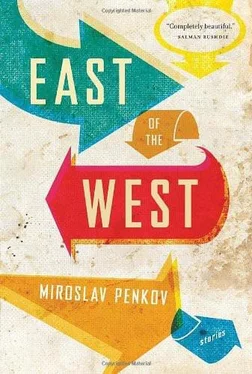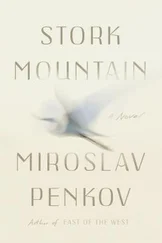I swam like I wore shoes of iron. I held the cross tightly and stepped on the slimy dome underneath. Soon Vera stood by me, in turn gripping the cross so she wouldn’t slip and drift away.
“Let’s look at the walls,” she said.
“What if we get stuck?”
“Then we’ll drown.”
She laughed and nudged me in the chest.
“Come on, Nose, do it for me.”
It was difficult to keep my eyes open at first. The current pushed us away, so we had to work hard to reach the small window below the dome. We grabbed the bars on the window and looked inside. And despite the murky water, my eyes fell on a painting of a bearded man kneeling by a rock, his hands entwined. The man was looking down, and in the distance, approaching, was a little bird. Below the bird, I saw a cup.
“It’s a nice church,” Vera said after we surfaced.
“Do you want to dive again?”
“No.” She moved closer and quickly she kissed me on the lips.
“Why did you do that?” I said, and felt the hairs on my arms and neck stand up, though they were wet.
She shrugged, then pushed herself off the dome and, laughing, swam splashing up the river.
•
The jeans Vera sold me that summer were about two sizes too large, and it seemed like they’d been worn before, but that didn’t bother me. I even slept in them. I liked how loose they were around my waist, how much space, how much Western freedom they provided around my legs.
But for my sister, Elitsa, life worsened. The West gave her ideas. She would often go to the river and sit on the bank and stare, quietly, for hours on end. She would sigh and her bony shoulders would drop, like the earth below her was pulling on her arms.
•
As the weeks went by, her face lost its plumpness. Her skin got grayer, her eyes muddier. At dinner she kept her head down, and played with her food. She never spoke, not to Mother, not to me. She was as quiet as a painting on a wall.
A doctor came and left puzzled. “I leave puzzled,” he said, “she’s healthy. I just don’t know what’s wrong with her.”
But I knew. That longing in my sister’s eyes, that disappointment, I’d seen them in Vera’s eyes before, on the day she had wished to be Bulgarian. It was the same look of defeat, scary and contagious, and because of that look, I kept my distance.
•
I didn’t see Vera for a year. Then, one summer day in 1976 as I was washing my jeans in the river, she yelled from the other side.
“Nose, you’re buck naked.”
That was supposed to embarrass me, but I didn’t even twitch.
“I like to rub my ass in the face of the West!” I yelled back, and raised the jeans, dripping with soap.
“What?” she yelled.
“I like to …” I waved. “What do you want?”
“Nose, I got something for you. Wait for — and — to — church. All right?”
“What?”
“Wait for the dark. And swim. You hear me?”
“Yeah, I hear you. Are you gonna be there?”
“What?”
I didn’t bother. I waved, bent over and went on washing my jeans.
•
I waited for my folks to go to sleep and then I snuck out the window. The lights in my sister’s room were still on and I imagined her in bed, eyes tragically fixed on the ceiling.
I hid my clothes under a bush and stepped into the cool water. On the other side I could see the flashlight of the guard and the tip of his cigarette, red in the dark. I swam slowly, making as little noise as possible. In places the river flowed so narrow, people could stand on both sides and talk and almost hear each other, but around the drowned church the river was broad, a quarter mile between the banks.
I stepped on the algae-slick dome and ran my fingers along a string tied to the base of the cross. A nylon bag was fixed to the other end. I freed the bag and was ready to glide away when someone said, “This is for you.”
“Vera?”
“I hope you like them.”
She swam closer, and was suddenly locked in a circle of light.
“Who’s there?” the guard shouted, and his dog barked.
“Go, go, you stupid,” Vera said, and splashed away. The circle of light followed.
I held the cross tight, not making a sound. I knew this was no joke. The guards would shoot trespassers if they had to. But Vera swam unhurriedly.
“Faster!” the guard shouted. “Get out here!”
The beam of light etched her naked body in the night. She had the breasts of a woman.
He asked her something and she spoke back. Then he slapped her. He held her very close and felt her body. She kneed him in the groin. He laughed on the ground long after she’d run away naked.
All through, of course, I watched in silence. I could have yelled something to stop him, but then, he had a gun. And so I held the cross and so the river flowed black with night around me and even out on the bank I felt sticky with dirty water.
Inside the bag were Vera’s old Adidas shoes. The laces were in bad shape, and the left shoe was a bit torn at the front, but they were still excellent. And suddenly all shame was gone and my heart pounded so hard with new excitement, I was afraid the guards might hear it. On the banks I put the shoes on and they fit perfectly. Well, they were a bit too small for my feet — actually, they were really quite tight — but they were worth the pain. I didn’t walk. I swam across the air.
I was striding back home, when someone giggled in the bush. Grass rustled. I hesitated, but snuck through the dark and I saw two people rolling on the ground, and would have watched them in secret if it weren’t for the squelching shoes.
“Nose, is that you?” a girl asked. She flinched, and tried to cover herself with a shirt, but this was the night I saw my second pair of breasts. These belonged to my sister.
•
I lay in my room, head under the blanket, trying to make sense of what I’d seen, when someone walked in.
“Nose? Are you sleeping?”
My sister sat on the bed and put her hand on my chest.
“Come on. I know you’re awake.”
“What do you want?” I said, and threw the blanket off. I could not see her face for the dark, but I could feel that piercing gaze of hers. The house was quiet. Only Father snored in the other room.
“Are you going to tell them?” she said.
“No. What you do is your own business.”
She leaned forward and kissed me on the forehead.
“You smell like cigarettes,” I said.
“Good night, Nose.”
She got up to leave, but I pulled her down.
“Elitsa, what are you ashamed of? Why don’t you tell them?”
“They won’t understand. Boban’s from Srbsko.”
“So what?”
I sat up in my bed and took her cold hand.
“What are you gonna do?” I asked her. She shrugged.
“I want to run away with him,” she said, and her voice suddenly became softer, calmer, though what she spoke of scared me deeply. “We’re going to go West. Get married, have kids. I want to work as a hairstylist in Munich. Boban has a cousin there. She is a hairstylist, or she washes dogs or something.” She ran her fingers through my hair. “Oh, Nose,” she said. “Tell me what to do.”
•
I couldn’t tell her. And so she kept living unhappy, wanting to be with that boy day and night but seeing him rarely and in secret. “I am alive,” she told me, “only when I’m with him.” And then she spoke of their plans: hitchhiking to Munich, staying with Boban’s cousin and helping her cut hair. “It’s a sure thing, Nose,” she’d say, and I believed her.
It was the spring of 1980 when Josip Tito died and even I knew things were about to change in Yugoslavia. The old men in our village whispered that now, with the Yugoslav president finally planted in a mausoleum, our Western neighbor would fall apart. I pictured in my mind the aberration I’d seen in a film, a monster sewn together from the legs and arms and torso of different people. I pictured someone pulling on the thread that held these body parts, the thread unraveling, until the legs and arms and torso came undone. We could snatch a finger then, the land across the river, and patch it up back to our land. That’s what the old folks spoke about, drinking their rakia in the tavern. Meanwhile, the young folks escaped to the city, following new jobs. There weren’t enough children in the village anymore to justify our own school, and so we had to go to another village and study with other kids. Mother lost her job. Grandpa got sick with pneumonia, but Grandma gave him herbs for a month, and he got better. Mostly. Father worked two jobs, plus he stacked hay on the weekends. He no longer had the time to take me plowing.
Читать дальше











